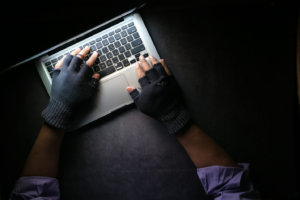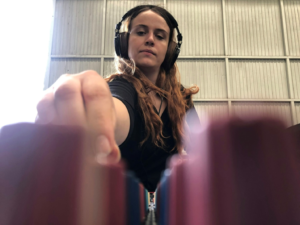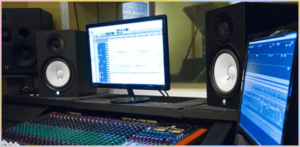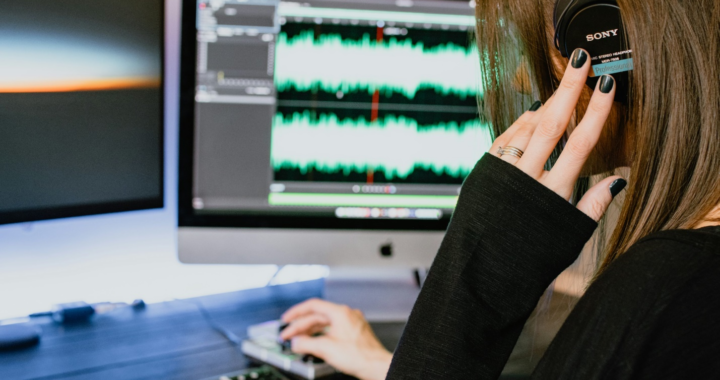Image Caption: A forensic audio specialist analyzing audio evidence to enhance and verify its authenticity.
Image File Name: forensic-audio-specialist-analyzing-audio-evidence
Alt-Text: A forensic audio specialist wearing headphones and working on a computer with audio waveforms displayed on the screen, analyzing audio evidence for clarity and authenticity.
Have you ever wondered how crucial audio recordings are in legal and investigative situations? Picture this: a criminal investigation, a civil dispute, or a corporate case—audio evidence can be the game-changer. We say this because the authenticity of the audio evidence, including their clarity, can help identify and interpret the sounds within them. A forensic audio specialist is trained to handle these tasks with precision, ensuring that the audio evidence is reliable and admissible in court.
The importance of forensic audio specialists cannot be overstated. They provide essential services that aid in uncovering the truth supporting law enforcement, legal professionals, and private investigators. Their expertise is often called upon to enhance poor-quality recordings, verify the integrity of audio files, and provide expert witness testimony in court.
Want to learn why calling a forensic audio specialist is crucial in many scenarios? This blog will discuss their role and the forensic audio analysis process, the integration with other forensic services such as forensic image analysis and digital forensic services, and the impact of their expert testimony in legal proceedings. Additionally, we will also provide insights into choosing the right forensic audio specialist and highlight the importance of their collaboration with other experts like computer forensics consultants and data forensic experts. So, without further ado, let’s get started:
Understanding Forensic Audio Analysis
If you’re wondering how forensic audio analysis works, then keep reading:
These forensic audio specialists use scientific methods to determine their authenticity, enhance clarity, and interpret the sounds within them. This process involves various techniques, such as filtering, noise reduction, and spectral analysis, to achieve accurate and reliable results. The primary goal is to ensure that the audio evidence is suitable for legal proceedings, investigations, and other critical contexts.
A forensic audio specialist is an expert trained in these techniques, possessing the skills and knowledge to handle complex audio evidence. Their role encompasses several key tasks:
- Authentication: Verifying the integrity of audio recordings to detect any signs of tampering or alteration.
- Enhancement: Improving the clarity of recordings to make speech or other sounds more intelligible.
- Interpretation: Analyzing and identifying sounds, such as voices, background noises, and environmental sounds, to provide context and information relevant to the case.
- Expert Testimony: Presenting findings in court as a credible expert witness, explaining the methods and results to judges and juries.
In addition to forensic audio analysis, related fields such as forensic image analysis and forensic video analysis expert services often complement the work of a forensic audio specialist. These disciplines work together to provide a comprehensive analysis of digital evidence, enhancing the overall investigative process.
Situations Requiring a Forensic Audio Specialist

In various legal cases, the expertise of a forensic audio specialist is invaluable. Their skills in analyzing and authenticating audio recordings can significantly influence the outcome of a case. Here are some examples where forensic audio analysis is crucial:
- Criminal Cases: In criminal investigations, audio recordings can be pivotal evidence. Whether it’s a recorded confession, surveillance audio, or intercepted communications, a forensic audio specialistcan enhance and verify these recordings to ensure their admissibility in court. For instance, in a case involving a recorded phone call, the specialist can enhance the clarity of the conversation, making it easier for the jury to understand and evaluate the evidence.
- Civil Disputes: In civil litigation, audio recordings can play a significant role in resolving disputes. For instance, in cases of workplace harassment or contractual disagreements, clear and authenticated audio evidence can support claims and defenses. A forensic audio specialistcan provide the necessary analysis to ensure the audio evidence is presented accurately.
- Family Law: In family law cases, such as custody battles or divorce proceedings, audio recordings may capture critical interactions that reflect on a party’s character or behavior. Enhancing these recordings and verifying their authenticity can be crucial in making fair and informed decisions.
In all these scenarios, the expert testimony provided by a forensic audio specialist in FL is essential. Their ability to explain the technical aspects of the audio analysis and present their findings clearly and credibly can make a substantial difference in the courtroom. An expert’s testimony can help judges and juries understand complex audio evidence, ultimately contributing to a just and accurate verdict.
The Forensic Audio Analysis Process
Forensic audio analysis involves a meticulous and systematic approach to ensure the accuracy and reliability of audio evidence. Here is a step-by-step overview of how forensic audio specialists analyze audio recordings:
Step 1: Collection and Preservation
The first step involves collecting the audio evidence and preserving its integrity. This includes making digital copies to prevent any degradation of the original recording. Proper documentation and chain of custody are maintained to ensure that the evidence is admissible in court.
Step 2: Preliminary Assessment
The specialist conducts a preliminary assessment of the audio recording to understand its quality, format, and any apparent issues. This initial evaluation helps in determining the best approach for further analysis.
Step 3: Authentication
Authentication involves verifying the integrity of the audio recording to detect any signs of tampering or alterations. Techniques such as examining metadata, checking for inconsistencies, and using forensic software tools are employed to ensure that the recording is genuine.
Step 4: Enhancement
Enhancement is a crucial step where the audio is processed to improve its clarity and intelligibility. This involves several techniques:
- Noise Reduction: Removing background noise and interference to make the primary sounds clearer.
- Equalization: Adjusting the balance of frequencies to enhance speech or specific sounds.
- Filtering: Applying filters to isolate certain frequencies and remove unwanted noise.
- Time-Frequency Analysis: Using spectrograms to visualize and analyze the audio signal in both time and frequency domains.
Step 5: Interpretation and Analysis
Once the audio is enhanced, the specialist interprets and analyzes the sounds. This can involve:
- Identifying and verifying voices.
- Analyzing background noises to provide context.
- Detecting any anomalies or unusual patterns.
Step 6: Reporting and Presentation
The final step is compiling the findings into a comprehensive report. The report includes details of the methods used, the results of the analysis, and any conclusions drawn. This report is often presented as expert witness testimony in court, where the specialist explains the findings to judges and juries.
Choosing the Right Forensic Audio Analyst

Selecting the right forensic audio specialist is crucial to ensure that your audio evidence is analyzed accurately and presented effectively. Here are key factors to consider when hiring a forensic audio specialist:
Qualifications and Certifications
One of the first things to look for is the specialist’s qualifications and certifications. A qualified forensic audio specialist should have a strong educational background in audio engineering, forensic science, or a related field. Additionally, certifications from recognized organizations, such as the International Association for Identification (IAI) or the American Board of Recorded Evidence (ABRE), indicate that the specialist has undergone rigorous training and adheres to industry standards.
Experience and Expertise
Experience is another critical factor. A specialist with a track record of handling various types of audio evidence in different legal contexts will be better equipped to manage complex cases. Look for a specialist who has worked on cases similar to yours, whether they involve criminal investigations, civil disputes, or family law matters. Their past case involvement can provide insights into their expertise and reliability.
Technical Skills and Tools
A competent forensic audio specialist should be proficient with the latest tools and techniques in audio forensics. This includes familiarity with Digital Audio Workstations (DAWs) like Adobe Audition and forensic software such as Sound Forge. The ability to use advanced techniques like noise reduction, equalization, and time-frequency analysis is essential for producing high-quality results.
Credibility and Reputation
The specialist’s credibility and reputation are also important. Check for testimonials, case studies, and references from previous clients or legal professionals. A reputable specialist will have a history of providing accurate and reliable analysis, as well as effective expert witness testimony in court.
Conclusion

Knowing when to call a forensic audio specialist is essential for ensuring that audio evidence is accurately analyzed and effectively utilized in various legal and investigative contexts. Whether it’s a criminal case, civil dispute, or family law matter, the expertise of a forensic audio specialist can significantly impact the outcome. Their skills in enhancing, authenticating, and interpreting audio recordings provide invaluable support to law enforcement, legal professionals, and other stakeholders.
The impact and value of forensic audio analysis extend beyond legal cases. It plays a critical role in verifying the integrity of recordings, clarifying important details, and providing credible expert witness testimony. By ensuring that audio evidence is handled with the highest level of accuracy and professionalism, forensic audio specialists contribute to achieving fair and just outcomes.
At Eclipse Forensics, we offer a range of forensic services tailored to meet your needs. Our team of highly qualified forensic audio specialists is equipped with the latest tools and techniques to provide accurate and reliable analysis. We also offer forensic image analysis, forensic video analysis, and comprehensive digital forensic services to support your case. For more details, feel free to reach out to us today.

